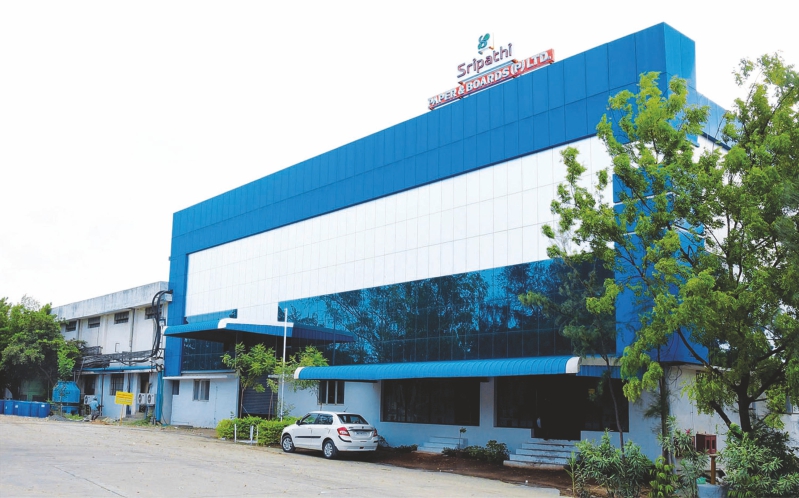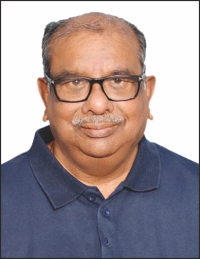
Srinidhi Alternative Investment Fund, an equity investment group in India stands as the major shareholder in Sripathi Paper & Boards. It extends its expertise beyond papers and boards into various sectors, including precision engineering, health foods, residential real estate, agricultural technology, and food processing. Recently, Srinidhi Alternative Investment Fund invested in Sripathi Paper & Boards which boasts a state-of-the-art duplex board and kraft paper manufacturing unit in Sivakasi, Tamil Nadu. Sripathi Paper & Boards has a comprehensive capacity of 800 MTPD including an in-house co-gen power plant with a capacity of 6 MW. Their primary focus is on cultivating cohesive efforts toward a unified cause, creating a collaborative environment for the seamless integration of Sripathi into the fund’s operating principles of people, processes, and systems. In line with the commitment to innovation and sustainable practices, Sripathi Paper & Boards is planning substantial capital expenditure (capex) of about USD 10 million. In a recent interaction with Paper Mart magazine, Mr. Padmanabh S Maydeo, COO, Srinidhi Alternative Investment Fund; Mr. Aashish Surender, Director, Sripathi Paper & Boards & Mr. Bharat Agarwal, Head of Operations, Sripathi Paper & Boards, talked about their investment in Sripathi Paper & Boards and their future plans after this integration.
Paper Mart: Can you please provide an overview of your group and its business portfolio?
Padmanabh S Maydeo: Srinidhi Alternative Investment Fund, is a boutique private equity investment group in India, that stands as the major shareholder in Sripathi. It extends its expertise beyond papers and boards into various sectors, including precision engineering, health foods, residential real estate, agricultural technology, and food processing. Renowned for transforming businesses into profitable ventures, Srinidhi Alternative Investment Fund emphasizes the importance of strong value systems and prioritizes sustainable, long-term relationships based on mutual trust. With a commitment to maximizing investment returns, the group leverages the transformative power of people, processes, and systems across its diverse portfolio.
PM: What prompted the investment fund to acquire a stake in Sripathi Paper & Boards? What are the key strengths and synergies that you expect to result from this acquisition?

PSM: The decision to invest in Sripathi Paper & Boards was propelled by strategic alignment with our investment philosophy, emphasizing sustainable, long-term relationships. Key strengths and synergies emanate from Sripathi’s position as a leading manufacturer of paper and paperboard, particularly its emphasis on recycled grades and dedication to eco-friendly and ethical practices. The robust demand for recycled paper, coupled with Sripathi’s strong brand image, enhances the strategic synergy. Additionally, the company’s strategic location near the port provides logistical efficiency, a valuable advantage in the acquisition.
Sripathi Paper & Boards boasts a state-of-the-art duplex board and kraft paper manufacturing unit, one of its kind in South India, located in Sivakasi, the printing hub of India. Furthermore, its diversified production units in Sathyamangalam, Tamil Nadu, encompass writing and printing and newspaper division. The comprehensive capacity of 800 MTPD includes an in-house co-gen power plant with a capacity of 6 MW.
Recognizing the untapped capacities of Sripathi, the investment fund envisioned scaling operations optimally, transitioning from a commodity player to a value-added, innovation-centric board player in the packaging segment. This strategic shift aligns with our vision for Sripathi’s future growth and success in the evolving paper industry landscape.
PM: How does the fund contribute to positive operational changes in Sripathi Paper & Board?

Aashish Surender: Our strategy is centred on building synergies through collaboration among professional teams on both sides. The primary focus is on cultivating cohesive efforts toward a unified cause, creating a collaborative environment for the seamless integration of Sripathi into the fund’s operating principles of people, processes, and systems. This alignment is facilitated through the collaborative efforts of a seasoned and diverse team with expertise spanning various facets of the paper industry.
Driving transformative initiatives within Sripathi’s operations is Mr. Bharat Agarwal, a qualified Chartered Accountant with 30 years of experience in the paper industry. He leads efforts in change management, process enhancement, and operational streamlining to ensure alignment with the fund’s strategic objectives.
Contributing to the efficiency and success of the collaboration is Mr. Padmanabh Suresh Maydeo, Chief Operating Officer of Srinidhi Alternative Investment Fund, leveraging over 28 years of experience in Operations Management and Value Enhancement. His expertise and strategic insights contribute to the seamless integration of Sripathi into the fund’s operations.
In enhancing Sripathi’s product line and fortifying its market presence, Mr. K.I.Viswanathan, a veteran marketing expert, serves as an Advisor in marketing and business strategy. His strategic guidance aims to broaden the product line, shift towards profitable products, and establish a robust marketing network, facilitating increased exports.
Reinforcing operational capabilities includes the onboarding of over a dozen industry professionals with backgrounds in production, marketing, and quality from top paper companies. This strategic recruitment ensures a wealth of experienced team of professionals in each responsibility oversee day-to-day affairs and contribute significantly to the operational excellence of Sripathi in line with the investment fund’s operational principles.
The ultimate goal is to establish a cohesive and unified operational framework where Sripathi operates in sync with the investment fund’s values, processes, and systems. This ensures that Sripathi becomes an integral and synergistic part of the investment fund’s operations, contributing to the shared objectives and sustainable growth envisioned by both entities.
Watch: JMC Paper Tech Launches New Subsidiary JMC Papers
PM: Please shed light on the new developments or upcoming products that can be expected post the acquisition.
Bharat Agarwal: Post the acquisition, Sripathi is undertaking significant initiatives to position itself as a dynamic player in the paper and paperboard industry. Sripathi has the highest market share in the southern part of India and its quality is at par with A’ Grade Mills. The company is looking to eliminate bad odor in kraft paper and has, to a great extent, been successful in eliminating it. A noteworthy development is the introduction of ECO-FBB (Folding Box Board), a revolutionary product addressing a substantial value gap in virgin folding box boards (FBB) and recycled white back paperboard segments. Successfully completing machine trials, ECO-FBB is poised to make a significant impact in the market.
Another strategic move is the upcoming launch of kraft liner, a paperboard known for its low-cost, high-value attributes. Targeting applications in the fast-moving consumer goods (FMCG) and secondary food packaging space, especially for export-focused Indian companies, this product is expected to contribute to revenue growth and margin expansion. Other new product development includes chip board and cup stock. The company also has a plan to introduce photocopy paper in the near future after the modernization of both paper machines.
In line with the commitment to innovation and sustainable practices, Sripathi Paper & Boards is planning substantial capital expenditure (capex) of about USD 10 million. The capex will focus on technology upgrades and new machinery, including sheeter cutters and the upgradation of the MG dryer section, designed to optimize production processes and meet the growing demand for various paper grades. Additionally, the company has put in place a specific time-bound plan to significantly improve its power and steam consumption costs by installing a new heat recovery boiler with a power turbine and furthering its vision of being a waste-to-wealth organization. The company has also made a plan to modernize the setup by adopting automation including new technology available in the market. These steps further emphasize Sripathi’s commitment to cost reduction, improved quality, and an increase in operating margins.
Simultaneously, as part of its global expansion strategy, Sripathi has actively increased its export focus to key markets such as the Middle East, Africa, Sri Lanka, and ASEAN countries exporting packaging boards, writing papers, and fluting mediums and test liners. This strategic move aligns with Sripathi’s vision to establish a robust international presence and reflects its commitment to exploring new avenues for growth in the global paper and paperboard market. This dual approach underscores Sripathi’s commitment to technological advancement, sustainability, and global leadership in the industry. In the end, the company is poised for increased growth in production, and new product developments, thereby increasing in topline and operating margins.
PM: What according to you are the key trends and challenges in the Indian paper industry?
BA: The key trends and challenges in the Indian recycled paper industry are multifaceted. On the positive side, there is a growing emphasis on sustainability, with an increasing number of consumers and businesses opting for eco-friendly products. The demand for recycled paper products is on the rise, driven by environmental consciousness and regulatory initiatives promoting sustainable practices. In the context of the Indian recycled paper industry, fluctuations in the availability of high-quality recovered paper, coupled with variations in prices, can impact the production costs for recycled paper manufacturers. Due to less recovery of wastepaper in India, mills using waste papers as raw material are largely dependent on imports. More than 40 percent of the total wastepaper requirement is imported. The challenge lies in ensuring a consistent and quality supply of raw materials to meet the growing demand for recycled paper products.
Another key trend and challenge revolves around energy prices. Power and steam costs are significant components of the operational expenses in the recycled paper industry. Coal and biomass prices present a significant challenge in the recycled paper industry. Steam is a critical utility in paper manufacturing processes and the cost of steam production can be influenced by factors such as fuel prices and boiler efficiency. Hence our focus is towards optimizing boiler systems, exploring alternative fuel sources, and implementing energy-saving measures to manage and control energy costs effectively.
The Indian recycled paper industry is navigating through the complexities of the global market. Competition from international players, fluctuations in raw material prices, and adherence to stringent quality standards pose challenges. We are committed to overcoming these challenges by investing in technology, fostering innovation, and building strategic partnerships to ensure the continued growth and sustainability of the recycled paper industry in India. As India’s consumption growth story continues, it is also expected to fuel higher demand for paper products used for packaging. During the year 2022, the packaging board industry dominated growth in the Indian paper industry. The share of packaging boards has increased to about 55 percent of the total paper industry. This growth has happened mainly due to the growth of online shopping, organized retail, and change in consumer behavior towards better packaging of FMCG products and ready-to-use/eat items. Looking ahead to next year i.e., 2024, moderation in margins is expected even after anticipated growth in terms of CAGR of 6 percent plus in the next 3-4 years.
PM: What is the Investment Fund’s vision for the future of the paper industry in India?

BA: The present domestic market is over 22 million tonnes per annum. This is likely to go to 30 million tonnes in the next 5 years. The industry being capital intensive, is slated for ramp-up of new investments, and modernization of existing mills in the near term. There is an increase in demand for packaging board and specialty paper i.e., tissue, wet strength paper, and lightweight coated paper, etc., and hence new investments are likely to come in these segments.
Sripathi envisions a future for the Indian paper industry characterized by sustainable growth, technological innovation, and environmental responsibility. We aim to create a new market segment within the Indian paper industry. The strategic approach involves tapping into the lower end of the virgin board and the higher end of the recycled board, introducing innovative products that cater to previously untapped consumer needs. By doing so, Sripathi seeks to pioneer a distinctive market segment, driving growth, fostering sustainability, and establishing itself as a trailblazer in the evolving landscape of the Indian paper industry. Additionally, our vision includes establishing an eco-sustainable operation, with a focus on sourcing key resources from recycled materials. These initiatives contribute to our commitment to environmental responsibility, positioning Sripathi as a leader in sustainable practices within the paper industry.
Ultimately, we envision a future where the paper industry in India serves as a model for responsible and forward-thinking businesses, contributing to environmental preservation and meeting the evolving needs of consumers in a rapidly changing world.



